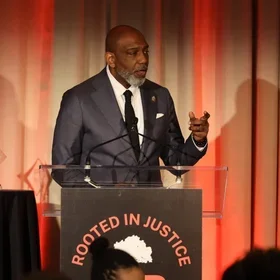Mentoring is often directly connected to students’ professional success in the rapidly evolving field of technology. In the Columbia University School of Professional Studies Executive M.S. in Technology Management program, scholarship in technology does not end when a student steps out of the classroom. The graduate degree is in a category all its own, pairing classroom fundamentals with an unrivaled mentorship program.
At the beginning of their second term, each student is paired with a recognized technological leader to be their personal mentor based on their goals and professional aspirations. Associate Program Director Art Chang says, “We use our huge network of thousands of professionals to make the best match possible, for the mentor and mentee.”
The current network of professional mentors includes hundreds of dedicated executives who invest in their mentee’s success. Executives working in every sector, from advertising to social services, provide invaluable real-world expertise.
Mentorship is a transformative experience that can accelerate personal and professional growth. Having a mentor is akin to having a personal board of directors. Chang says, “The greater experience and wisdom of a mentor can unlock potential, speed critical decisions, and prevent damaging mistakes.”
“Entrepreneurship, and really leadership in general, is a team sport,” says Dawn Barber, the program’s industry liaison. “You can’t build a company or lead a team alone—you need a community, and mentorship is the best way to start building your community.”
Agility separates Technology Management’s mentorship program from others. This program distinguishes itself by constantly looking toward the future, which can mean evolving, expanding, and making industry-informed changes.
“Technology today means flatter, more nimble, user-centered, agile organizations,” says Chang. “As a result, our mentorship matching is highly individualized and curated.”
Mentors meet with students one-on-one, providing practical advice and guidance throughout their studies. Meetings with these mentors continue even as students defend their master’s projects, where their help can be critical. The relationships that develop can last long after the student graduates.
“As an alumnus and current faculty member, I can personally attest to the invaluable role of mentors in guiding and shaping our students’ journeys,” says Lauren R. Goodwin, chief information officer at NASA. “This is a distinguishing aspect that sets Columbia apart from other programs. The mentorship program creates a sense of community and lifelong connections.”
Plans are underway to expand student opportunities. Says Barber: “In my role as a conduit to the New York tech community, I want our students to have as much exposure to the New York start-up and innovation communities as possible. Having mentors who have built companies, or are investors, or lead teams within larger companies, is so important.”
By connecting students to the tech industry in a real-world way, the mentorship program is shaping the leaders of tomorrow. “Our goal is to develop leaders who combine innovation, entrepreneurship, and ethics to create positive economic growth and social impact,” says Barber. “Developing positive mentor relationships—qualified sounding boards—is essential to success.”
About the Program
Columbia University’s Executive Master of Science in Technology Management is designed to respond to the urgent need for strategic perspectives, critical thinking, and exceptional communication skills at all levels of the workplace and across all types of organizations.


